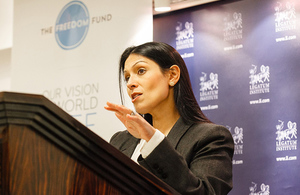New UK action against modern slavery protects women at risk from trafficking in Med
Priti Patel has announced investments to protect refugees at risk of being trafficked in the Mediterranean region will be doubled.

Priti Patel speaking at a Freedom Fund event ahead of International Day for the Abolition of Slavery. Picture: Rahil Ahmad/Freedom Fund
Delivering the keynote speech at a Freedom Fund event in Central London (1 Dec) to mark International Day for the Abolition of Slavery today (2 Dec), Priti Patel set out how the Department for International Development (DFID) is to boost its support to tackle modern slavery.
Ms Patel also announced a new approach to increase and expand DFID’s work on ending modern slavery and child labour, which will complement the international work of other parts of government.
The new support will double the UK’s investment to £8million in a special protection fund set up to keep women and girl refugees in the Mediterranean region safe from trafficking and exploitation.
The fund will be used to better identify, protect and refer vulnerable female migrants and refugees, by providing shelters as a safe alternative to dangerous camp environments and strengthening national counter-trafficking mechanisms in Greece and the Balkans.
Ahead of yesterday’s Freedom Fund event International Development Secretary Priti Patel said:
Modern slavery is a barbaric crime, which destroys the lives of vulnerable exploited people across the globe. It is shocking that this kind of exploitation still exists in today’s society – and the international community needs to step up to address it.
I am determined to build on the UK’s existing leadership in tackling the issue and this includes doubling support for women and girl refugees in the Mediterranean, in order to keep them safe from trafficking and exploitation.
But this work isn’t for government alone, and we will only succeed if we join forces – businesses, governments, charities, activists, faith groups, and individuals – working together to stop these crimes for good.
Prime Minister Theresa May has demonstrated the UK’s leadership in this field by creating the world leading Modern Slavery Act, and establishing the cross-government taskforce, which includes the International Development Secretary.
DFID’s new approach will extend this leadership onto the international stage, as set out in the department’s Bilateral Development Review 2016.
DFID will increase its focus on:
- tackling modern slavery in conflict and humanitarian situations;
- commissioning new research on how we can prevent and reduce modern slavery;
- addressing the underlying causes of modern slavery, particularly amongst children; and
- working with businesses to achieve slavery-free supply chains.
This builds on progress DFID is already making in tackling modern slavery internationally. Support to the Work in Freedom programme is helping women facing slavery and exploitation in domestic households and the garment industry in South Asia and the Middle East – and has reached over 200,000 people so far.
There are an estimated 45 million victims of modern slavery across the world. Modern slavery, including child labour, acts as a barrier to sustainable, inclusive development.
DFID will continue to work with businesses, governments, charities, activists, faith groups, individuals going forward to end modern slavery, particularly child labour, in the world’s poorest countries.